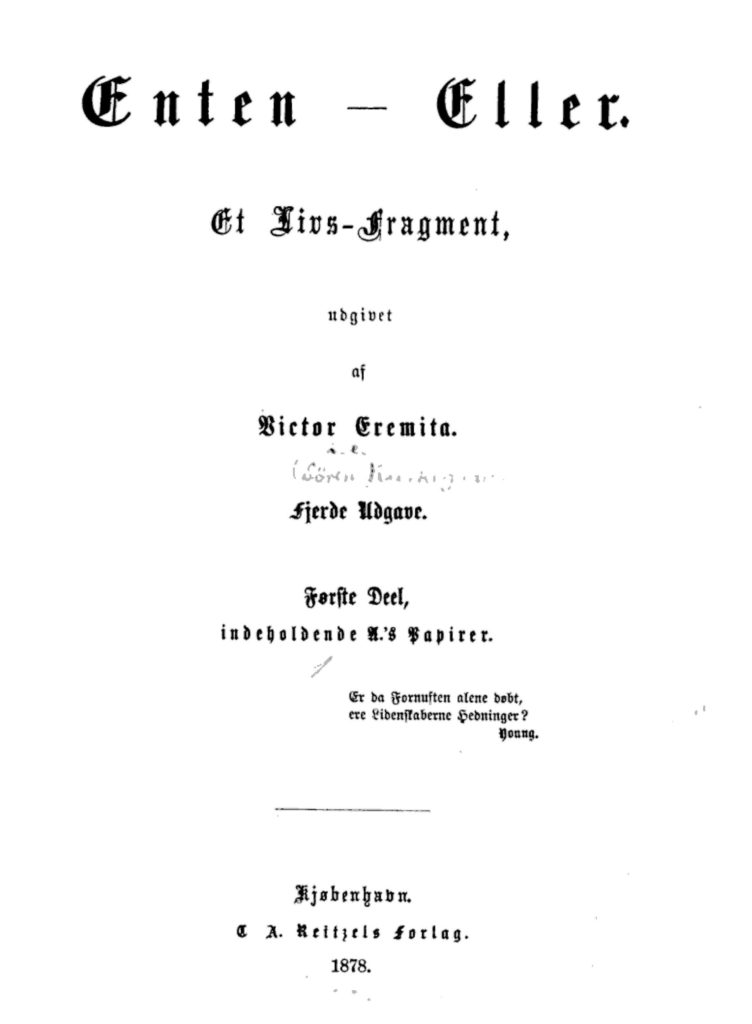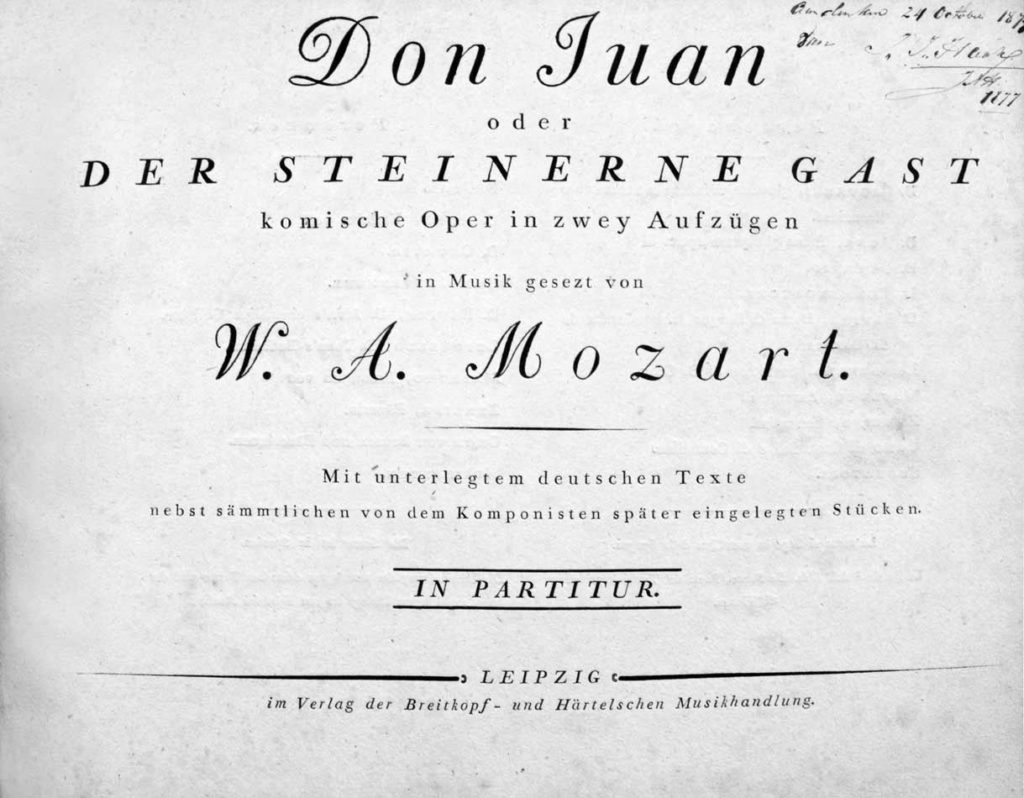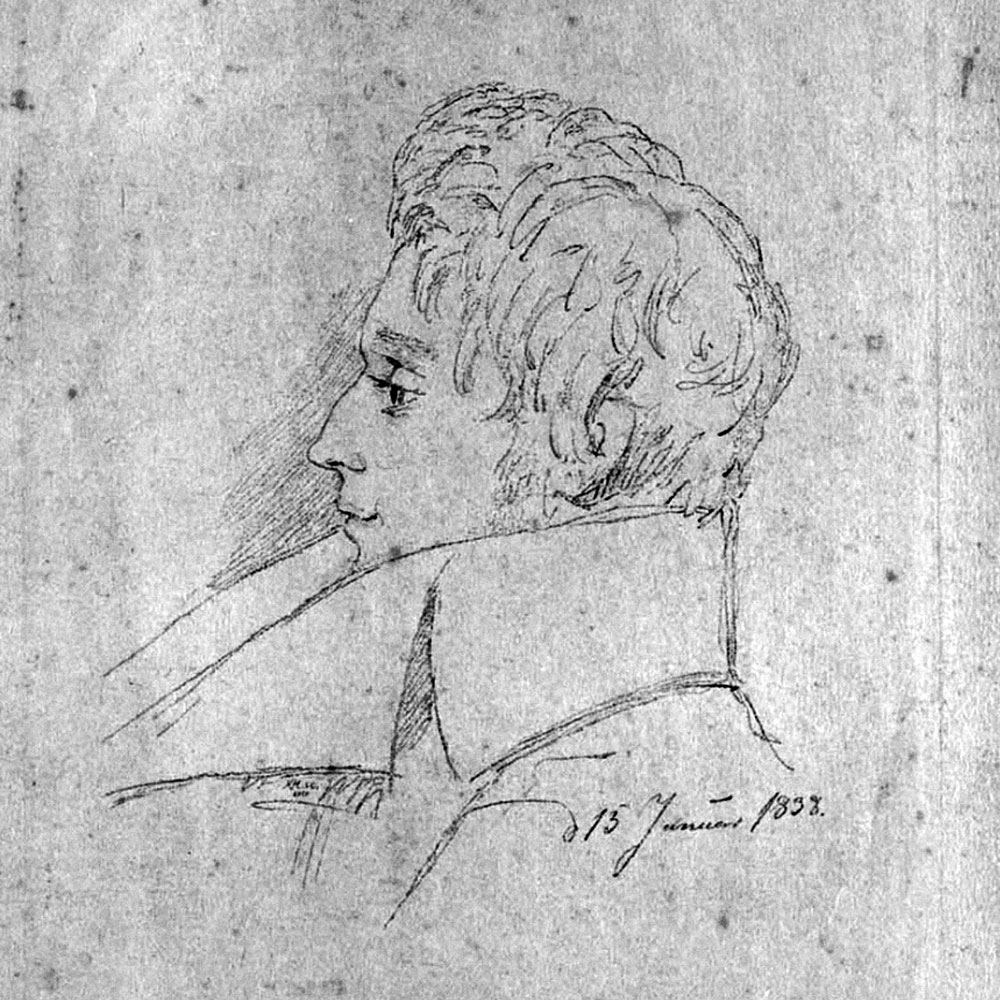By AimA
Essay - Philososphy
Søren Kierkegaard
THE IMMEDIATE EROTIC STAGES OR THE MUSICAL-EROTIC
After Victor Eremita’s “Warning” and after Diapsàlmata, in the First Part of Enten Eller, Kierkegaard examines what he himself defines as “The immediate erotic stages” and, ultimately, “Erotic Musical”.
The task of his research, says Kierkegaard, is “to show the meaning of the erotic-musical and to indicate the various stages which, being immediately erotic, are also all essentially musical.”.
The interpretative key of this statement lies in associating the adjective “immediate” with the adjective “musical”.
From the outset, Kierkegaard invites the conception of this “new” language: the musical language.
According to Kierkegaard, each type of idea, in order to be best expressed, requires the medium that best suits it.
By medium, we mean the instrument through which the idea is expressed. The mediums are different, among these we can mention: oral and written language, painting, sculpture, dance, music. What is important to note is the relationship between medium and idea.
The more an idea is abstract, the less is the possibility of its repetition by the medium that expresses it; the more concrete an idea is, the greater is the possibility of its repetition by the medium.
For this reason, music is the most suitable medium for expressing an abstract idea because it is evanescent and instantaneous like the idea and at the same time unrepeatable. This is because music is (exists) the moment it is played, listened to and at the same time associated with the idea.
In the same way, the abstract idea is (exists) at the very moment in which it is realized in our mind and lies here, until it is evoked by an equally abstract medium such as music. And so, once again, music and idea would coincide in the instant in which the idea would be set to music and therefore represented as an unrepeatable instant, since one instant is never the same as another.
The concrete idea, on the other hand, finds in language the medium that best knows how to express it. An idea expressed through language can be repeated, while an idea expressed by music cannot be, as this is an instant during which, idea and expression of the idea itself coincide.
The question of the ineffability of matter and of the idea is already posed in the Proem of Dante Alighieri’s Paradise where, in the relationship between memory and expressive capacity, the limits of language are highlighted in expressing what is so abstract that it cannot not even be retained by memory. Images of light and impalpable acts such as dance and song, full of rituals and devoid of matter, become ineffable precisely because they are abstract.
However, Kierkegaard does not want to lead to the conception of an abstract idea, therefore ineffable, but to the conception according to which an abstract idea is instantaneous and therefore its medium is necessarily music.
The key to the discussion lies in the IDEA-INSTANT-MUSIC association.
Now, the idea that must be expressed and that will be meaningful in the analysis of the Three Immediate Erotic Stages is that of sensuality.
According to Kierkegaard, the abstract idea par excellence is sensual genius, it naturally follows that the medium most capable of expressing this idea is music.
SENSUALITY as an idea, over the centuries, has undergone its own evolution according to the judgment attributed to it by society.
In paganism sensuality existed as psychically determined and was not dominated because it was not seen as something sinful and rebellious.
Sensuality (the way it is thought of by most people today) has been placed in Christianity under the determination of the spirit.
That is: sensuality is posited by the spirit at the moment in which it denies it.
The spirit denies sensuality in the sense that it opposes it as REFLECTION and not immediacy and therefore as duration and not instantaneous.
The spirit does not become a negative principle by denying sensuality; but positive because it places sensuality in the world.
This sensuality denied and placed by the spirit is what Kierkegaard calls EROTIC SENSUAL GENIUS which, to be expressed in its immediacy, must be expressed through music.
The two figures placed by Christianity (one the triumph of sensuality and of the flesh; the other the triumph of reflection and of the spirit) in two words sensuality and spirituality, are respectively represented by Don Giovanni (especially that of Mozart) and from Goethe’s Faust.
Don Giovanni is the one who enjoys the love of every woman who, through who knows what demonic force, inevitably gives herself to him. He is not looking for the EXTRAORDINARY woman, but for the ORDINARY woman, the woman who possesses what all other women do not have: femininity. Faust, on the other hand, is looking for the extraordinary, for the extraordinary woman: Gretchen.
Later he desires Elena (nothing less than the most beautiful woman in the world) but Elena, a pagan and unabashed spiritual beauty, is not Faust’s true object, an object which, in the end, remains uniquely Grethcen, full of that spirituality and religious fervor that characterizes it. Thus the spirit wins: Mephistopheles is defeated, the flesh is trampled on and desire is imprisoned.
In “Don Giovanni”, on the other hand, the demonic is unleashed in a crazy dance together with Don Giovanni whose very unconscious power of seduction is demonic.
The winner comes out the meat that would be pulverized only when we had to call our libertine to trial, with the power of reflection.
Recalling the task that Kierkegaard set himself for himself, I am now going to indicate the various immediate erotic (and therefore musical) stages through which desire completes its evolution until it rises to desiring desire, to sensuality, or rather to that quality of who awakens, in the individuals around him, certain impulses and desires.
There are three stages that describe the phenomenology of desire.
The FIRST STAGE is suggested in the PAGE of FIGARO (from “The Marriage of Figaro” by Mozart) The page (Cherubino) is the adolescent who falls in love with all women, neither desiring nor possessing any of them.
Cherubino is the budding Don Giovanni. In him, desire, constantly in the potential phase, never becomes act.
In this first erotic stage, desire and object of desire (the desired) are one thing.
The determination of desire is not inherent in its object (since there is no object) but in the depth of its essence, in a single phase of perennial falling in love without an end and without an object.
As Kierkegaard says: “Desire is in total acquiescence,
he quenches his thirst and sees his equilibrium broken only when the desiring subject and the desiring object separate”.
It is interesting to observe how the androgynous character of Cherubino perfectly represents this unity and object of desire. In the meantime, observe that he is a SOPRANO among the various basses and tenors which are the other male characters.
This seems to be the representation of a being at the same time man and woman, who, living in a static condition of falling in love (remembering the sad condition of the hermaphrodite mentioned by Aristophanes in the Platonic Symposium) has no need at all for the part missing feminine. What essentially makes the figures of Cherubino and Don Giovanni different from each other is that the former lives in an eternal sigh (for this reason the first stage is defined as the stage of DREAMING DESIRE); while Don Giovanni, desiring, obtains the object of desire that Cherubino even lacks.
The SECOND STAGE is symbolized by Papageno, a character from Mozart’s “The Magic Flute”. Papageno, the fowler, is in constant search of his Papagena which does not represent femininity, but the missing part of Papageno. Thus he seeks his subject (the only Papagena) in multiplicity.
In this stage desire discovers the object.
Papageno’s is the DESIRE OF THE SINGLE under the determination of the multiple.
He is not looking for femininity, but for the single individual who completes it and this individual can only be Papagena as a missing part of Papageno.
This is the stage that represents the SEARCHING DESIRE because Papageno does nothing but search throughout the story for his Papagena and even when he thinks he possesses it it vanishes into thin air almost symbolizing Papageno’s desire: the search continues.
The evolution of this stage essentially insists on the fact that:
if in the first stage the subject did not exist, now desire and desired are split into two entities.
The limit of seeking desire is that of not desiring and therefore not being desiring, but for this type of desire one must reach the third stage which includes the dreaming desire of Cherubino and the seeking desire of Papageno, and which elevates them to desiring desire .
The different stages that follow each other dialectically converge in the third stage which comes to be the aufhebung (preservation and overcoming) of the previous two moments: the desire from dreaming becomes seeking and finally desiring and desiring as dreaming and seeking.
In the THIRD STAGE, symbolized by Don Giovanni, desire has its absolute object in the individual.
As already mentioned, Don Giovanni is in search of the ordinary and, unlike Cherubino, he continually searches for a single object that represents him.
To further clarify the ideas we can project ourselves for a moment into the Latin elegy and evoke the melancholy figures of Tibullius and Propertius alongside the playful one of Ovid who laughs in the face of love pains writing, a sort of book of magical formulas with its remedies for love pains – Remedio Amoris –
If Cherubino and Papageno can easily be traced back to Tibullio and Propertius, who, in front of their woman-mistress (the domina) are repudiated and betrayed servants, the figure of Don Giovanni cannot be traced equally easily to that of Ovid. Don Giovanni, in fact, while declaring “I like them all” does not declare his “nequitia”, a fault. What unites Ovid and Don Giovanni is that both love every woman and both withdraw from what is the “servitum amoris” (servitude of love) in favor of a love lived actively (and not passively like Cherubino, Papagno, Tibullio or Propertius.)
However, unlike Don Giovanni, Ovidio considers his conduct reprehensible; while Don Giovanni does not carry out a reflection on his own conduct: for him it is natural ugly, from the moment of the conquest of the woman to the possession of her.
This element of naturalness is not present in Ovid who dedicates an entire book (the “Ars Amatoria” or “the art of loving”) to the art of conquering women and keeping love.
The art of seduction does not exist in Don Giovanni, he obtains it by desiring. Papageno, representative of the second stage and of seeking desire, still does not possess the strength of desire which demonically allows Don Giovanni to make all the women of every sort. Papageno appears very limited, compared to Don Giovanni: it is Papageno that the musical seems to diminish precisely because Papagena is the search for an ethically determined love and therefore, this type of love even seems to go beyond the confines of the immediate erotic stage.
Instead, every movement of Don Giovanni appears to be inseparable from the music: his life is musicality, immediacy, it is a series of notes, a series of instants.
Only judgment, reflection, spirit, can kill this character who is an expression of the demonic as determined as the sensual, which judgment would give life to the character opposite him: Faust. Faust is therefore an a-musical character, with well-defined contours, contours that Don Giovanni will never assume as he is totally abstract, in the idea and in the medium that expresses him.Finally, after outlining the figure of Don Giovanni as the maximum expression of erotic sensual genius and after having stopped and fixed his essential features for a moment; Kierkegaard urges us to build the image of this character who is perpetually on the move, through music, because thousands of words and rivers of ink would always be inadequate to describe a character like Don Giovanni.
Finally Kierkegaard exhorts us to listen:
“Listen to Don Giovanni, … that is, if you can’t get an idea of Don Giovanni by listening to him, you will never get it! Listen at the beginning of your life; as lightning comes out of the darkness of the storm cloud, so he bursts forth from the depths of seriousness, swifter than the flight of lightning, more changeable than this, yet so sure; hear how it plunges into the multiplicity of life, crashes against its solid bank, hear these soft dancing violin notes, hear the wink of joy, hear the jubilation of longing, hear the festive bliss of enjoyment; hear the his wild flight, he hurries before himself, ever faster, ever more unstoppable, … listen to the unbridled thirst of passion, listen to the whisper of love, listen to the whisper of temptation, listen to the vortex of seduction, listen to the silence of the instant, … listen, listen, listen to Mozart’s Don Giovanni”.


Tags
Søren Kierkegaard
Enten-Eller
Don Juan
W.A. Mozart
Die Zauberflute
Philosophy
Denmark
Scandinavian Philososphy
De umiddelbare erotiske stadier
Author
AimA Lichtblau - February 17th 2023
Sources
Københavns Universitet Søren Kierkegaard Research Centre
